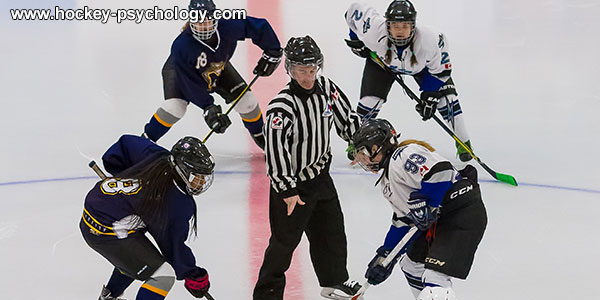Moving on From Past Losses
Coping with a tough loss, getting knocked out of a tournament, or missing the playoffs can sting for some hockey players.
Many players dwell on what went wrong or mentally replay the game keeping the memory alive.
Think of a personal example when you suffered a loss that ended your season…
Did that loss stick with you for a long time?
Did it negatively affect your play when you faced that opposing team the following season?
A tough loss can do one of two things for you:
- It can cause you to question your abilities or create doubt that you can beat a particular team.
- It can motivate you to improve your game in future games.
Tough losses are not easy to digest but how much a tough loss affects your game is up to you.
Your Response to a Tough Loss is a Mental Process
Of course, a tough loss will hurt. That is quite normal.
After all, you train hard and put in a lot of sweat equity with hopes of achieving your seasonal goals.
But, at some point, you need to move past that loss and focus on what’s next.
Objectively evaluate the loss and how you will improve your game in the future is the first step.
After you identify those mental and physicals skills, you need to improve upon, it’s time for action.
Lastly, but most importantly, you need mental toughness to continue to push forward and stay focused on THIS year’s objectives.
Last year, the University of North Dakota hockey team needed to win a couple of games to make the NCAA tournament. North Dakota faced the Miami RedHawks for two must-win games to keep their season alive.
Unfortunately, North Dakota lost one game, 3-4 and tied the second game, 2-2, eliminating them from making a 16th straight trip to the NCAA tournament.
This season, North Dakota has used last year’s tough loss as a motivation to get back to the tournament.
North Dakota has displayed great mental toughness winning three games of a four-game stint in the third period or overtime.
North Dakota head coach Brad Berry talked about the importance of staying focused on this year’s objectives as they prepared for a rematch against the Red Hawks.
BERRY: “We talk about turning the page and starting on zero… We have goals. We want to win the league, win the Penrose. We want to have home ice, and be in the top four. You have to make sure we don’t look too far ahead on those and you’ve got to make sure that we take care of each and every game, each and every weekend.”
It is important to learn from tough losses and stay motivated…
The past is the past and it’s not an omen that history will repeat itself.
Learning from a Tough Loss
If you lose, learn from the experience. If you lose a tough game, get mentally tough!
Motivate yourself by using your tough loss to improve even more! Take a growth approach to your performance.
Should you beat yourself up over the lose or decide how you can outsmart or outplay the competition in the future?
Improve your mental skills (focus, confidence under pressure, anxiety management, mental toughness, etc).
When all the training and preparation is complete, your mental game gives you the competitive edge.
Related Articles on Hockey Mental Game:
- How to Play with Intensity on Your First Shift
- How to Process Mistakes Like a Pro
- How to Be Positive During a Losing Streak
*Subscribe to The Sports Psychology Podcast on iTunes
*Subscribe to The Sports Psychology Podcast on Spotify
The Mental Edge for Hockey

The Mental Edge for Hockey teaches you proven and simple mental game strategies so you can overcome fear of failure, lack of confidence, slumps or poor composure, take your practice game to competition, and boost your confidence in hockey. You learn simple, actionable mental game strategies to help you perform at your peak!
I’ve worked with athletes for 30 plus years – and know the top challenges that undermine performance when you perform in games. Now you can tap into my expertise and experience in coaching hockey players on the mental game.
In this program, you’ll learn the TOP 10 mental training lessons for hockey players – the same strategies I teach one-on-one athletes I coach on the mental game. My clients pay thousands of dollars for personal coaching, but now you can have the same strategies to improve your mental game – at a fraction of the price.

Leave a Reply